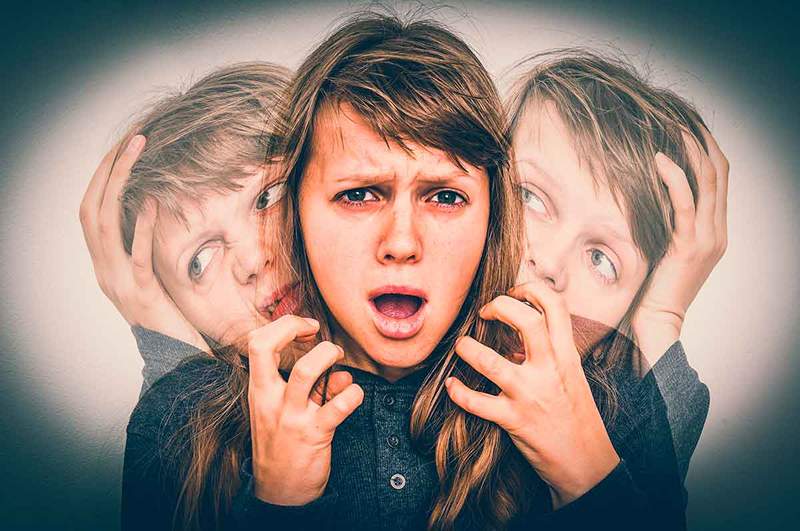Reactive psychosis causes, symptoms and treatment

- 1687
- 216
- Gregory King
Psychosis is an alteration of perception, behavior, emotions and thought that can lead people to experience a serious disconnection with reality. When a person suffers from psychosis, it presents symptoms such as anxiety, lack of concentration, hallucinations, delusions or even depression, among many others. This is a state that is commonly presented in schizophrenia and other psychotic disorders such as Reactive psychosis, a psychological disorder we are talking about below.
Content
Toggle- What is reactive psychosis?
- Reactive psychosis symptoms
- Causes of reactive psychosis
- Treatment of reactive psychosis
- Links of interest
What is reactive psychosis?
Reactive psychosis is an unusual psychological disorder in which periods of psychotic behavior suddenly and shortly. These psychotic behaviors can become from hallucinations, delusions or confusion among others.
To be able to talk about reactive psychosis, it must appear suddenly and not extend beyond a month. There are three types of reactive psychosis
brief:
- Reactive psychosis with an external factor unleashed clear: In this type of reactive psychosis there is an external key factor that has triggered the disorder and that can be clearly detected, normally a stressful or traumatic event that leads to the person affected at a level of anxiety or high stress.
- Reactive psychosis without an obvious trigger factor. It is the brief psychotic disorder that appears without apparently a previous stress or traumatic event.
- Reactive psychosis during the postpartum period. This type of reactive psychosis appears in women during the first weeks after giving birth, however, this subtype is not an especially common phenomenon.
Reactive psychosis symptoms
The symptoms of this disorder usually last a few days or weeks, however their severity can even lead the patient to experience certain risks such as suicide or violent behaviors. These are symptoms that are also given in other psychotic disorders such as schizophrenia. The most common are hallucinations and delusions.
- Hallucinations: One of the most common symptoms in psychosis are usually hallucinations, altered perception states in which the person can feel, listen or see things that do not exist in reality. This occurs when, for example, a person listens to voices or sounds that do not exist, or when they think they can see something or someone who is not present in real life.
- Deluste: Delusions are another common symptom in psychosis and are based on maintaining and defending incoherent or not logical beliefs such as paranoid, conspiracy or greatness ideas, totally disconnected with reality. Thus, it can be a delirium to affirm that they are chasing us or that they have put microphones to spy on our house, when this is not true.
In addition to hallucinations and delusions, other common symptoms are:
- Disorganized language: This symptom goes hand in hand with disorganized thought. It is presented in an incoherent -speaking form, showing little or no relationship between some ideas and other.
- Extreme humor changes: People can go from one emotion to another in little brevity of time and exaggerated.
- Disorganized behavior: Like language, the behavior of the person can be disorganized, carrying out incoherent behaviors and with little logical appearance, such as undressing in public sites or suddenly screaming.
- Lack of personal care. People affected by this disorder can suffer a lack of basic care such as maintaining adequate hygiene or physical appearance.
 Taquipsiquia, when the mind is too fast
Taquipsiquia, when the mind is too fast Causes of reactive psychosis
Although the causes of this disorder are not entirely clear, a possible genetic relationship important for its development. It seems that it is more common for this condition to appear in people who have relatives who suffer or have suffered psychotic disorders or mood, such as schizophrenia, bipolar or depression disorder.
Reactive psychosis is a disorder that not only develops due to biological or genetic causes, but also contextuals. Thus, a Traumatic event As a tragic loss or a violent accident, they can trigger this state of alteration and disconnection of reality.
In addition, other personality characteristics such as poor coping skills can make a person more prone to react
In this absence as a weapon of defense against a very stressful reality.
Treatment of reactive psychosis
Normally the symptoms of reactive psychosis They refer for themselves in a period not exceeding one month. Although most people who present this disorder, only experience it once, after a stressful occasion, some may live it on more occasions. If this happens and the symptoms do not decrease, it will be a mental health professional who should contemplate if the patient is not suffering a major disorder.
During the development of reactive psychosis, health professionals often evaluate symptoms to rule out other causes and commonly tend to prescribe some medications such as antipsychotics or antidepressants to be able to control symptoms. In addition, patients are usually supervised with a view to controlling possible or others.
Links of interest
Psychology Today. Brief Psychotic Disorder. https: // www.psychologytody.com/US/Conditions/Brief-Psychool-Disorder
Medlineplus. Brief Psychotic Disorder. https: // medlineplus.GOV/ENCY/ARTICLE/001529.htm

